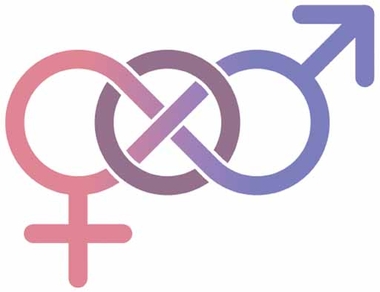Why do you think my sexual orientation doesn’t count?

by Sara Ritsch
Op-Ed
I came out to the public as a bisexual woman in my second or third year of college, when I moved to Louisiana. I’d known since I was a child, when my first kiss was a girl; and then again in middle school, when I idolized and admired my girlfriends; and then again in high school, when I had my first experiences with another cis girl; and finally again, when I became a woman.
But I didn’t tell people until I was 19 or 20 – I even remember denying it to a boyfriend, who asked, “Baby, are you bisexual?” in a moment of shock and awe when I slipped up. So I lied.
I just lied to everyone, because to be bisexual meant, “What if I’m a lesbian?” and to be a lesbian meant I couldn’t like whatever boyfriend I had that day. And that didn’t make sense to me, nor to anybody else. Until Lana.
Lana was a stunning half Greek, half Ukrainian wallflower riddled with shyness and a clever but quiet wit. Our best friendship budded quickly and fluidly. I was living in the dorms at about 17 when we met, and we immediately warmed over an instance of sexual assault the day before my freshman year of college. She helped me laugh through what I now accept as trauma. After that, our life became sleepovers, chocolate chip cookies paired with hot chocolate, Fuzzy’s Tacos and midnight walks through campus.
My friendship with Lana was mostly platonic, but there were interactions over the years that we couldn’t deny to be out of love and attraction, not tequila, despite societal jokes and implications. And tequila. Everyone could tell, too; but it was brushed off as a “girl thing” and not a “solidifying my sexuality” thing. I don’t know if it solidified hers, but to me, it was real.
Her mother moved back from Greece and she had the brilliant idea to tell this Greek Orthodox wife-of-a-possible-mobster that she and I were exploring bisexuality as a team. I remember sobbing massive globules of tears and snot all over my legs as she told me her new perspective: I was the devil, I was manipulating her, what we did was wrong and it was time to “break up”.
This was my first instance of discrimination. Over my ugly weeps from the bedroom, I overheard my parents saying they could tell we had feelings for each other, and I was mortified. Everything came to its peak of humiliation. I didn’t want to be bisexual anymore.
The journey continued when I moved to Louisiana and met older girls who had dated women, been “all the way” with women and who were known to be themselves. I was allowed to announce it, so I did. But it was confusing to people, because I still dated men. I didn’t know why either. Maybe Harrie Farrow said it right, “Bisexuals are confused.”
But are we? Or is everyone else? On many levels, it is hard for society to accept the idea that a seemingly heterosexual cisgender woman identifies on the Kinsey scale as a member of the LGBTQ community. Some days I spent with Lana, I thought I was a lesbian. To this day I’ll admit I sometimes think I’m a lesbian. But being in love and in a relationship with a man isn’t conducive to that notion. It’s on that level that we, bisexuals, become confused.
Because, “What if I’m a lesbian?” and to be a lesbian means I can’t like the boyfriend I have today. That’s the toss, the thought that runs through my mind as I try to decipher my attraction or my feelings of lust, even love. Because I am monogamously in love with a man, my relationship solidifies my level of heterosexuality. But I’m not hetero – am I? Ah, what does it mean?
There is an unmentionable in everybody’s head. Mine is the upset of passion. The bisexual’s dilemma is one of communal confusion over whose hand I’m meant to hold in public and what society will say about me if I do.
I have the “heterosexual privilege” of being one way on the street, and that means I lose my lesbianism, my LGBTQ inclusion, if I do. I lose the “lesbian privilege” of counting. Straight people think I have fallen into the temptation of college experimentation; gay people think I’m trying too hard to fit in. Where, then, do I lay?
I rest in the middle, maybe swinging left or right when I meet the right person. I lay where I’m meant to, because I was born and grew up with the internal conflict of being either/or. But I’m not either/or. I’m both.
My bisexuality means I’m a cisgender woman whose capacity to fall in love is just privileged enough to fall in the middle of the spectrum, but just inconvenienced enough to make other people confused. But I’m not confused anymore. Just like all of you, I lay on the Kinsey scale exactly where I’m meant to. And just like all of you, I don’t like being questioned, converted or laughed at. It’s my sexuality, not anyone else’s, anyway.
Wait, don’t even get me started on the straight male’s objectification of bisexuality – well, piece that one together yourself. We’re real.
Copyright 2016 The Gayly – September 24, 2016 @ 7:05 a.m.





